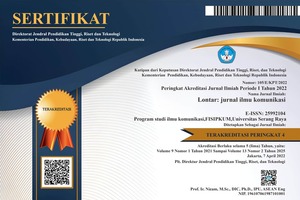Hambatan Komunikasi dalam Perkuliahan Daring pada Masa Pandemi Covid-19
DOI:
https://doi.org/10.30656/lontar.v9i2.4037Keywords:
Communication Barriers, Online Lectures, Technology Barriers, Environmental Barriers, Psychological BarriersAbstract
This study was conducted to obtain an overview of the communication barriers between lecturers and students during the online class in the Covid-19 pandemic. The method used in this research is a case study and descriptive qualitative in which the result obtained from the research and the processed of the data about the communication barriers that occur in online lectures are deeply processed. The collected data consists of primary data that is obtained from online interviews and discussions with informan. Secondary data is obtained from various literature sources related to information and policies online lectures. Based on the result of research, show that at least there are three communication barriers that take place in online lectures, namely technological, environmental, and psychological barriers. Those three barriers are considered as lecture processed disruptions which implicate that there are students' difficulties in studying and understanding the lecture material well.
References
Creswell, J. W. (2013). Research Design Pendekatan Kualitatif, Kuantitatif, dan Mixed (Terjemahan). Yogyakarta: Pustaka Pelajar.
Devito, J. (2011). Komunikasi Antar-Manusia; Kuliah Dasar . Jakarta: Karisma Publishing.
Effendy, O. U. (2017). Ilmu Komunikasi Teori dan Praktek. Bandung: Remaja Rosdakarya.
Hariyanti, D., Mun’im, A. H., & Hidayat, N. (2020). Identifikasi Hambatan Mahasiswa dalam Pelaksanaan Pembelajaran Biologi secara Daring Selama Masa Pandemi Covid-19 di Kabupaten Jember. ALVEOLI: Jurnal Pendidikan Biologi, 1(1), 11–21.
Kementerian Pendidikan dan Kebudayaan Indonesia. Surat Edaran Menteri Pendidikan dan Kebudayaan Republik Indonesia No. 3 Tahun 2020 tentang Pencegahan Corona Virus Disease (Covid-19) Pada Satuan Pendidikan. , (2020).
LLDIKTI. Surat Kepala LLDIKTI Wilayah IV Nomor: 1685/LL4/TU/2020 tentang Himbauan Antisipasi Penyebaran Virus Corona. , (2020).
Mulyana, D. (2019). Ilmu Komunikasi: Suatu Pengantar. Bandung: Remaja Rosdakarya.
Nasrullah, R. (2013). Cyber Media. Yogyakarta: IDEA Press.
Nugroho, S. A., Wati, A. F., & Dianastiti, F. E. (2020). Kendala dan Solusi Pembelajaran Daring di Perguruan Tinggi (Constraints and Solutions in the Implementation of Online Lesson in Higher Education). Jalabahasa, 16(2), 196–205.
Rakhmat, J. (2019). Psikologi Komunikasi (Edisi Revisi). Bandung: Simbiosa Rekatama Media.
Rektor Universitas Serang Raya. Surat Keputusan Rektor Nomor 229/01.04/UNSERA/III/2020 tentang Pelaksanaan Kerja secara Daring. , (2020).
Vera, N. (2020). Strategi Komunikasi Dosen Dan Mahasiswa Dalam Meningkatkan Kualitas Pembelajaran Daring Selama Pandemic Covid-19. Avant Garde, 8(2), 165–177.
Wowor, H. A. F., & Putri, K. Y. S. (2021). Efektivitas Komunikasi dalam Perkuliahan Online terhadap Proses Belajar pada Mahasiswa Manokwari Papua Barat. Jurnal Komunikasi Pendidikan, 5(1), 79–92.
Yin, R. K. (2019). Studi Kasus, Desain dan Metode. Jakarta: PT. Raja Grafindo Perkasa.
Downloads
Published
Issue
Section
License
By submitting an article to the journal, the author(s) agree to transfer the published article's copyright to the journal, which will act as the publisher. This means the journal will have the right to publish the article in various forms, including reprints. The journal will maintain the publishing rights to the published articles.
In line with the license, authors and third parties (readers, researchers, and others) are allowed to share and adapt the material. In addition, the material must be given appropriate credit, provided with a link to the license, and indicated if changes were made. If authors remix, transform, or build upon the material, authors must distribute their contributions under the same license as the original.






